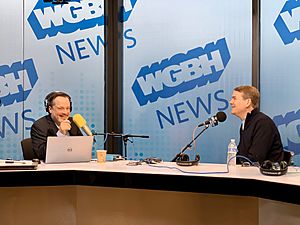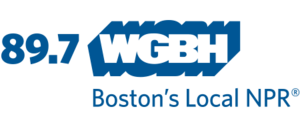WGBH (FM) facts for kids
 |
|
| Broadcast area | Greater Boston |
|---|---|
| Frequency | 89.7 MHz (also on HD Radio) |
| Branding | GBH 89.7 |
| Programming | |
| Language(s) | English |
| Format | Public radio |
| Subchannels | HD2: WCRB simulcast HD3: WCAI simulcast |
| Affiliations | National Public Radio (NPR) Public Radio Exchange (PRX) American Public Media (APM) |
| Ownership | |
| Owner | WGBH Educational Foundation |
|
Sister stations
|
|
| History | |
|
First air date
|
October 2, 1951 |
|
Former call signs
|
WGBH (1951–1953) WGBH-FM (1953–1973) |
|
Call sign meaning
|
Great Blue Hill |
| Technical information | |
| Facility ID | 70510 |
| Class | B |
| ERP | 100,000 watts |
| HAAT | 198 meters (650 ft) |
|
Transmitter coordinates
|
42°12′42.00″N 71°6′51.00″W / 42.2116667°N 71.1141667°W |
| Links | |
| Webcast | FM/HD1: HD2 (WCRB): HD3 (WCAI): |
WGBH (89.7 MHz) is a public radio station located in Boston, Massachusetts. It's known as GBH since August 31, 2020. WGBH is a key member of National Public Radio (NPR). It also works with Public Radio Exchange (PRX) and American Public Media (APM).
The station is owned by the WGBH Educational Foundation. This foundation also runs TV stations like WGBH-TV and WGBX-TV in Boston, and WGBY-TV in Springfield.
WGBH is often called Boston Public Radio or Boston's Local NPR. During the day, it broadcasts news and information programs. These include shows from NPR News and The World, which WGBH helps produce. At night, the station plays jazz music.
Before December 2009, WGBH offered a mix of news and entertainment. It had local jazz and blues shows. Its slogan was Boston’s NPR Arts & Culture Station. This helped it stand out from WBUR-FM, another NPR station in Boston that focused on news. After 2009, WGBH added more national news programs.
The letters "GBH" stand for Great Blue Hill. This is where WGBH's main radio transmitter is located in Milton, Massachusetts. Great Blue Hill is the highest natural point in the Boston area. It's about 635 feet (193 meters) tall.
WGBH is very popular. Its number of listeners has almost doubled in recent years. It is now one of the top 10 most-listened-to NPR news stations in the United States.
Contents
How WGBH Reaches Listeners
WGBH's main signal is very strong, using 100,000 watts of power. This allows it to cover a large area. It reaches the eastern part of Massachusetts, all of Rhode Island, and parts of Connecticut, New Hampshire, and Maine. Even Providence, Rhode Island gets a clear signal from WGBH.
Other WGBH Stations
WGBH also runs a separate service for the Cape Cod and Islands area. This service focuses on news and information all day. You can hear it on three stations: WCAI in Woods Hole, WNAN in Nantucket, and WZAI in Brewster.
WGBH also owns WCRB, which is a station dedicated to classical music. You can also listen to WCRB through WJMF in Smithfield, Rhode Island.
Both WCAI and WCRB can also be heard on WGBH's HD Radio channels. This means you can get their programs through WGBH's main broadcast. All WGBH, WCAI, and WCRB programs can also be streamed online from anywhere in the world.
WGBH's History
WGBH Educational Foundation received its first radio license in 1951. This happened thanks to the Lowell Institute Cooperative Broadcasting Council. This group was formed by local universities and cultural places. Their goal was to offer free public lectures in Boston, following a gift from John Lowell Jr. in 1836.
WGBH began broadcasting on October 6, 1951. Its very first show was a live broadcast of the Boston Symphony Orchestra. Within ten years, WGBH grew enough to partner with the Five Colleges. They set up a repeater station, WFCR, for western Massachusetts. WFCR became its own station in 1962 and is now a main NPR station for that area.
WGBH was one of the first stations to join NPR. It was part of the very first broadcast of All Things Considered in 1971.
In 2016, WGBH started broadcasting some of its shows from a studio inside the Boston Public Library. This new studio is located in the Back Bay area of Boston.
Popular Shows and Programs

WGBH mainly broadcasts news programs from NPR or PRI. On weekends and some weekday evenings, you can hear public affairs shows and other interesting programs. These include:
- This American Life
- The Moth
- Selected Shorts
- Freakonomics
- On Being
- Radiolab
- Studio 360
- The New Yorker Radio Hour
Music Programs
Jazz music is played on weekend evenings and overnight. Before July 2012, WGBH also played jazz on weeknights. This was changed to make more room for news and information programs.
Saturday mornings feature syndicated programs like Weekend Edition and Wait Wait... Don't Tell Me!. You can also hear A Celtic Sojourn, a long-running local show that plays Celtic music.
Shows Made by WGBH
WGBH creates several programs for its local Boston audience:
- Boston Public Radio: A daily two-hour talk show about public affairs, hosted by Jim Braude and Margery Eagan.
- Greater Boston: Radio Edition: A radio version of WGBH-TV's nightly public affairs show, broadcast on Saturday afternoons.
- A Celtic Sojourn: A three-hour program of Celtic music on Saturday afternoons.
- Arts and Ideas: A three-hour news and arts magazine on Sunday evenings.
WGBH also produces shows that are broadcast in other parts of the country:
- America's Test Kitchen Radio
- Says You!
- The World (co-produced with the BBC World Service)
- From the Top
- Innovation Hub
Changes to Programming
Until December 2009, WGBH played a lot of classical music. This included recordings made by WGBH of local performances. It also broadcast live shows from the Boston Symphony Orchestra. WGBH also had folk music on Saturday afternoons and blues on Saturday evenings.
In September 2009, WGBH bought WCRB, another local classical music station. WGBH then moved all its classical music programs to WCRB. WGBH itself became an all-news and information station. This change meant that some listeners in areas like Cape Cod could no longer easily hear the classical music on WCRB.
In June 2012, WGBH announced it would reduce jazz programming. Weeknight jazz shows were replaced with more news and information. Eric Jackson still hosts nine hours of jazz on weekends.
In 2013, Jim Braude and Margery Eagan became the hosts of Boston Public Radio. They also brought their monthly Ask the Governor program to WGBH.
 | Chris Smalls |
 | Fred Hampton |
 | Ralph Abernathy |



